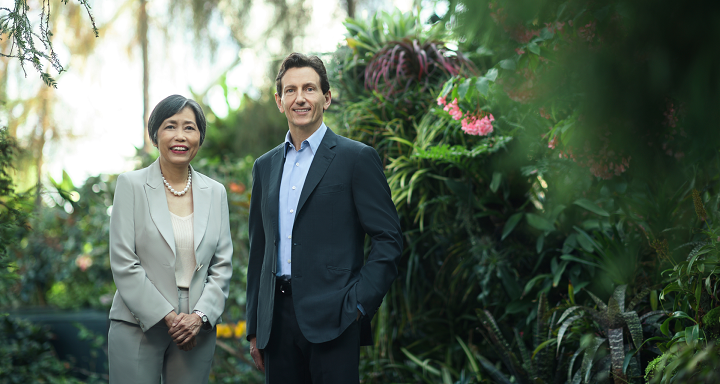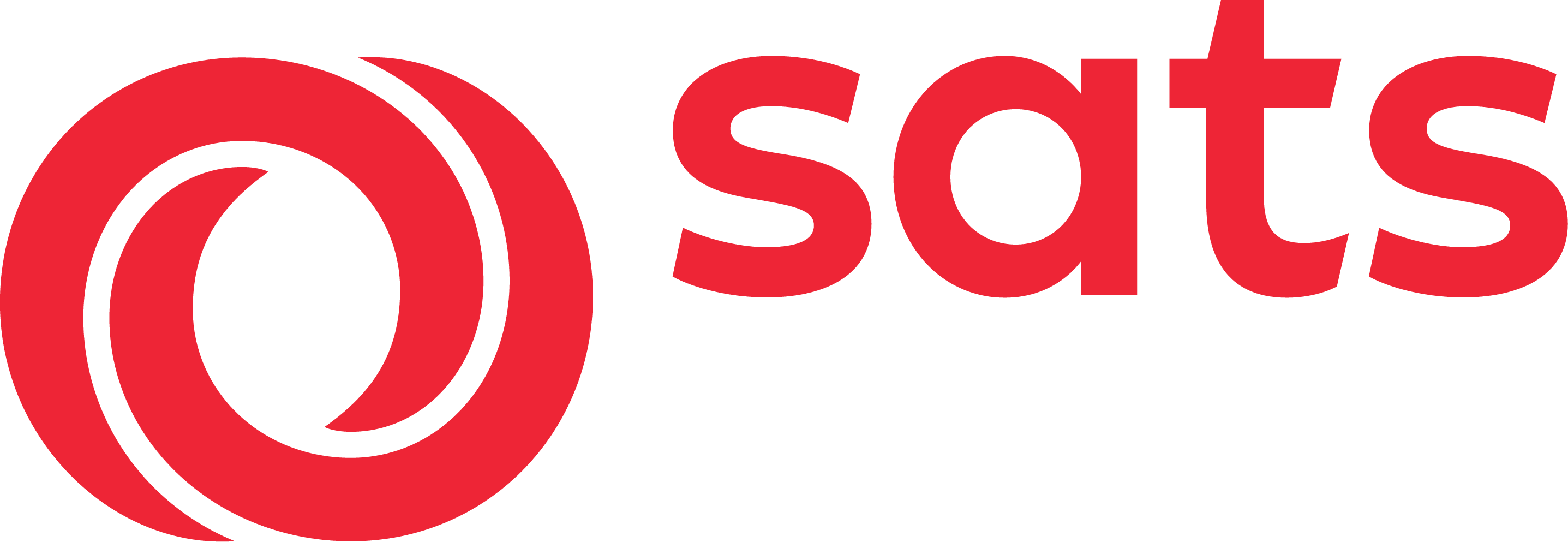Chairman and PCEO's Statement
Download the Chairman and PCEO's Statement (1.5MB).
We look to the future with renewed vigour, ready to support the rebound of aviation and accelerate the company’s growth into new segments.

Dear Shareholders,
This has been one of the most challenging years in the history of SATS, as the global COVID-19 pandemic restricted international travel for the entire twelve months. During this crisis, our customers and our communities have recognised SATS as an essential service provider, highlighting the importance of our company’s purpose to feed and connect communities.
We started on our transformation prior to COVID-19 and were reshaping our organisation and targeting our unique capabilities at new growth opportunities. In the wake of the pandemic, we accelerated our pace of transformation, and today, we are seeing results from some of the early initiatives, bringing about quarterly improvement in revenue, profitability, and cash flows. We are grateful for the government support we have received to mitigate the decline in aviation volumes, but part of the quarterly improvements was contributed by growth in revenue from non-travel segments of the business and management initiatives in reshaping the company. We look to the future with renewed vigour, ready to support the rebound of aviation and also accelerate the company’s growth into new segments.

Challenging Year
The year began with the almost complete grounding of the world’s commercial airline fleets. Even now, despite the ongoing rollout of vaccines around the world, new COVID-19 variants continue to create uncertainty over the reopening of international borders, delaying the rebound of international air travel. As a result, volumes in all of the Group’s aviation-related business declined. Operating statistics of the combined volume of the company and its subsidiaries showed that flights handled declined by 84.3%, and ship calls by 62.8%. We have repurposed the resulting capacity in our flight kitchens to serve new customers in market segments like food services and retail, resulting in a net decline of 47.1% in aviation and non-aviation meals. Only cargo remained relatively resilient with a decrease of 35.5%, buttressed by the demand for essential food, medical supplies and the growth in eCommerce. As a result of this dramatic fall in aviation volumes, Group revenue declined 50% from the prior year to S$970 million, despite the growth in revenue from customers in new segments. PATMI fell to a net loss of S$78.9 million despite the helpful benefit of various Government support schemes. EBITDA dropped 79.7%, but remained positive at S$72.3 million. Return on equity fell to minus 5% from 10.3% the year before. While conditions were challenging in FY20-21, SATS saw strong sequential improvements in revenue and profitability each quarter, with the fourth quarter back in profit.
As our new financial year begins, many countries are now exploring ways to reopen borders safely. The world economy is projected to rebound with growth of 6% in 2021, with global passenger traffic numbers forecast to recover to 52% of pre-COVID-19 levels by the end of the year. However, the lingering effects of the pandemic are expected to curtail mobility and impact the recovery of travel for several years, so it is important that SATS continues its strategy of building new revenue streams from new market segments while it supports the rebound in aviation.
Reshaping SATS
We are working with our airline customers to reimagine travel by digitising touch points and developing innovative food packaging to minimise physical contact during the journey. Our goal is to enable the aviation industry to operate safely, efficiently and sustainably, both in the current restricted travel environment as well as when volumes recover. With this in mind, we made the decision to protect, rather than cut back on, investments in the digitalisation of our business. Innovations we have implemented include the use of a robotic device, UV Vector Air, by AISATS for more efficient aircraft interior cleaning to enhance safety; digital menus with Scoot to provide passengers with a safe, low-touch opportunity to order food, drinks and shopping at any time; a new digital cargo system in the cloud to help us to navigate through difficult conditions safely and efficiently; and digital integrated supply chain capabilities to support a diversification of our global food sources.
However, we have had to undergo some painful cost reductions in line with the dramatic fall in aviation volumes during the year. We did not undertake these actions lightly. We ensured the retention of valuable core competencies and capabilities,
and tried our best to treat all those impacted fairly and respectfully. In this regard, we are particularly grateful to our unions for their cooperation, and also the board and management for volunteering to lead from the top by taking pay cuts. As
a result of all these actions, SATS was able to reduce operating expenses by 42.9% to $980.1 million for the year.
Growth Opportunities
Demand has increased for temperature-sensitive supplies like perishable food, vaccines, and other medical equipment that have proven to be so important during this global health crisis. To ensure the highest possible handling standards, we have invested in new equipment like cool dollies, and have continued to achieve CEIV certification across our network of cargo terminals to enhance the reputation of SATS in handling temperature-sensitive cargo. SATS has played a significant role in facilitating the transportation of vaccines and other essential medical supplies like oxygen concentrators to India. Our associate in China, Beijing Aviation Ground Services, facilitated the transport of the Sinovac vaccine from Beijing to Jakarta. In India, AISATS has shipped over 45,000 tonnes of medical supplies to remote parts of India through the Lifeline Udaan flights.
The demand for eCommerce has also surged during the crisis, as consumers switched their disposable spending from services to products, driving the online share of global retail up to 17% in 2020 from 14% in 2019. The airside location of our digitalised cargo facilities puts us in a unique position to support this growth, as online shopping takes a larger and larger market share.
We are also seeing good results from the expansion of our food business into new, non-travel related market segments across Asia. To serve our growing base of customers across our network from airlines to foodservice and retail, we started product development with Food City, a frozen food producer in Thailand, prior to acquiring an 85% shareholding in the company in a recent deal. This acquisition will strengthen our culinary capabilities from fresh to cook-chill, ambient and frozen. SATS Food City will have the capacity to produce 90,000 meals a day and will tap on the established food ecosystem in Thailand to produce frozen meals that will be distributed across our network of 32 kitchens. Scaling up our food production capability in this way gives us greater operating leverage to compete effectively across both the aviation and non-aviation segments to support the growth that we are seeing in non-travel related food channels. SATS Kunshan in China, for example, has seen double-digit growth from key customers such as YUM, Hema and Aldi. In Singapore, we are gaining share of the retail market with the launch of new products such as Home Chef ready-to-eat meals in 7-11 stores and Dots doughnuts in Cheers.
The biggest food trend today is plant-based protein, projected to grow in market size from US$10.3 billion in 2020 to US$14.5 billion by 2025. Singapore is poised to be the region’s plant-based innovation and development hub, and SATS is well-positioned
to capture a share of the market by acquiring distribution rights for plant-based brands such as Growthwell and Impossible Foods through Country Foods and working with our customers to develop products made from plant-based proteins. For example,
our subsidiary in the United Kingdom, Monty’s Bakehouse, has also partnered with Fable Foods to develop plant-based meat products for the UK market.
Dividend
In light of the significant uncertainties in the operating environment, the Board of Directors believes that it would be prudent not to pay a dividend for FY2020-21. This decision will allow the company to preserve more jobs and capabilities to support SATS’ customers as aviation volumes resume and to pursue opportunities outside of aviation.
Acknowledgements
We thank Mr Yap Chee Meng for his service as an independent non-executive Director for close to eight years. The Company has benefitted greatly from his guidance and dedicated service as a Board member, the Chairman of the Audit Committee and a member of the Board Risk and Safety Committee.
At the same time, we welcome Mrs Deborah Ong and Ms Vinita Bali as Independent Non-Executive Directors of the Company. Mrs Ong and Ms Bali joined the Board on 16 November 2020 and 10 May 2021, respectively. Mrs Ong recently retired as a partner of PricewaterhouseCoopers LLP. She has over 30 years of public accounting experience, and is a Board member of a number of Government Agencies, including the Monetary Authority of Singapore. Ms Bali brings leadership experience from Britannia Industries Ltd., The Coca-Cola Company and Cadbury Schweppes PLC in various CEO, General Management and Marketing roles in India, the UK, Nigeria, South Africa, Latin America and the USA. She is currently serving on the board of various companies, including public companies listed on NASDAQ and BSE/NSE.
The past year was not business as usual. We are grateful for the support of our customers, business partners and government agencies. We thank you, our shareholders, for your faith and trust in the ability of SATS to ride through this storm and
the Board of Directors for their guidance and sound advice. Above all, we appreciate the dedication of our staff, who stayed committed to our company’s purpose to feed and connect communities despite all the risks and uncertainties. Thanks to
them, SATS is established as an essential service provider by keeping supply chains open, supporting efforts to protect public health, and keeping airports across Asia operating safely, even during these most difficult of circumstances.
Euleen Goh
Chairman
Alex Hungate
President & CEO Executive Officer
1 June 2021
